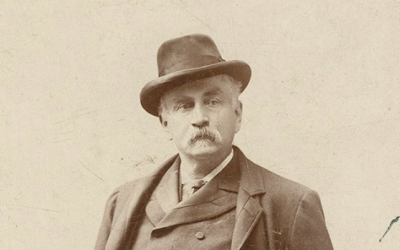When Lydia McIntyre died in Omaha, on January 2, 1937, at the age of sixty-three, she was well known to many of the city’s residents. Although not prominent in any field of endeavor except one, McIntyre was a familiar figure on Omaha’s streets. The Omaha World-Herald, on January 6, said of her: “Although she had ‘panhandled’ nickels and dimes on Omaha streets for 25 years, . . . [she] will be buried today with her own money. Mrs. McIntyre, who died Sunday, was found to have a $400 bank account, insurance policies totaling about the same amount, and a houseful of things at 1812 Cuming street, including a $75 fur coat.
“Mrs. McIntyre was a familiar figure on Omaha’s streets. Plain, drab, wearing a thin brown coat, and carrying a shopping bag, she ‘worked’ Fifteenth and Sixteenth streets almost every afternoon. Pedestrians were always startled when she sidled alongside and murmured, ‘Could you give me a nickel or a dime for a cup of coffee?’ Many shelled out. A man who formerly lived at Mrs. McInTyre’s home said she made more money than any other panhandler in Omaha. Her appearance of worn respectability was her chief asset.
“She might have had much more, it was said, except that she liked to go on parties. On parties, she always insisted on paying her share. Before going out she would dive into an old trunk and take a handful of nickels and dimes.
“In her home Mrs. McIntyre had trunk after trunk filled with good, clean blankets, linen, outmoded dresses etc. There were bundles of letters, some received as long as 25 years ago. She apparently never threw away a letter or a Christmas card, or even a patent medicine advertisement. She had many old pictures of herself.
“Thrifty to the last, Mrs. McIntyre was asked as she was loaded into the ambulance to go to the county hospital: ‘Got any money?’ She replied: ‘No, I used to make some when I was young, but not now.'”
The World-Herald‘s account of the funeral on January 7 reported that Mrs. McIntyre had planned her own, which took place in a mortuary chapel. “Handkerchiefs wiped eyes, and sobs and sniffles were heard” as the Rev. Paul Erickson of First Covenant Church conducted the service. She was laid to rest beside a daughter, who had died in 1919, at Forest Lawn Cemetery. No relatives were present at the final rites for a familiar figure on Omaha streets for over twenty-five years.



